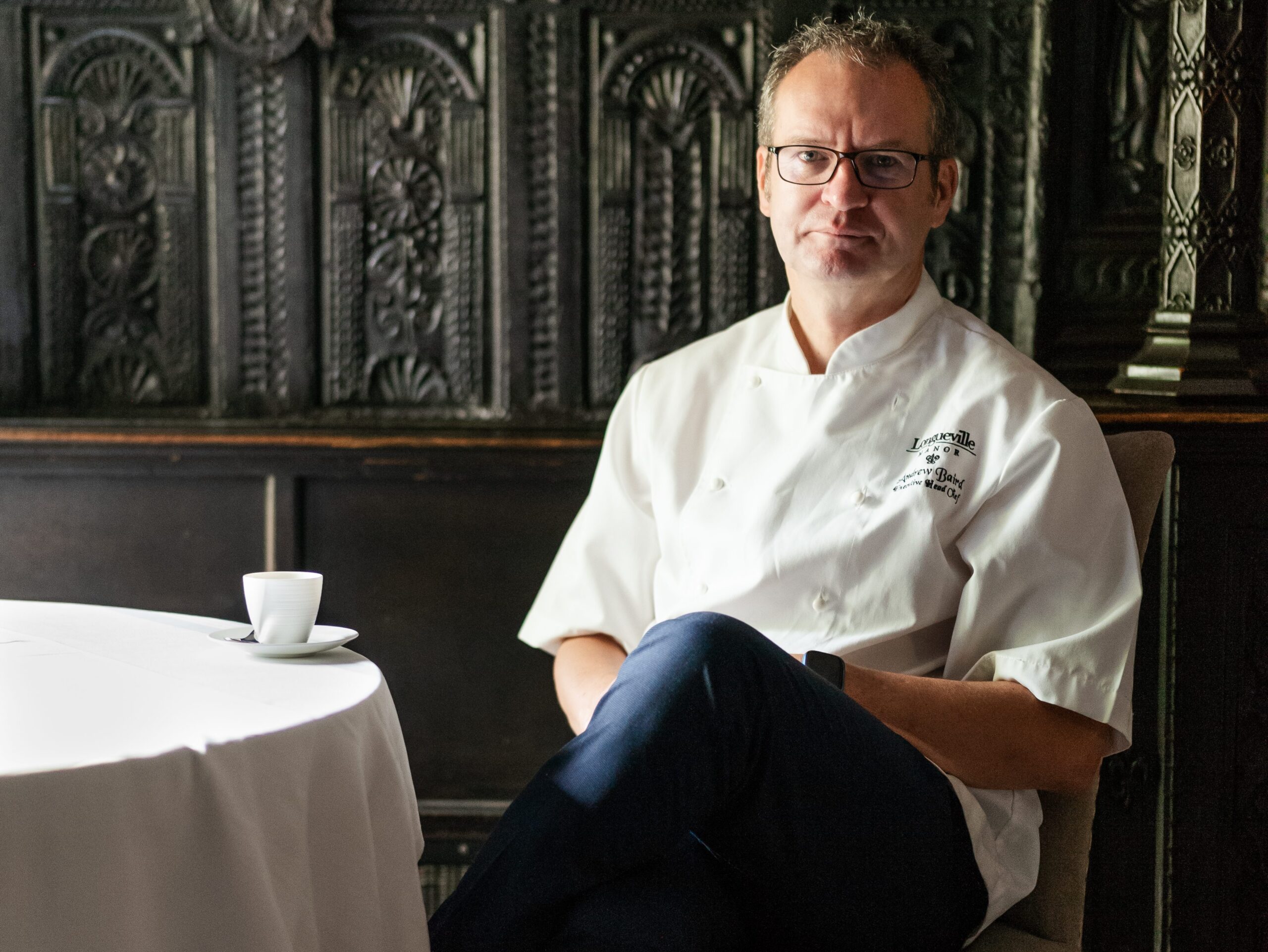
Several times a week, scallop diver Bob Titterington delivers hundreds of scallops to chef Andrew Baird at The Restaurant at Longueville Manor. The shellfish arrive by the bongo, the name for an enormous bucket that holds around 250 scallops, still in their shells. Usually, Titterington dives for the scallops earlier on the same day they are delivered, sometimes working while it’s dark outside.
“We open them all by hand and clean them ourselves, which is not what all of Bob’s customers do,” Baird tells Observer on an early June day at Longueville Manor, a hotel located on the Channel Island of Jersey. “It’s often the case that I’m serving people scallops that are straight out of the sea. I have photos of myself putting the scallops in the pan when they’re still alive—they’re that fresh.”
Baird has worked with Titterington since 1995, a few years after he joined Longueville Manor as head chef. Baird himself is a master diver, and goes out with Titterington as often as his schedule allows. During my visit (planned in honor of World Oceans Day), Baird accompanied our group on a RIB boat ride to Jersey’s protected Les Écréhous islands, where we spotted Titterington and his two nephews mid-dive. They were counting towering piles of scallops on their small boat, many of which were destined for the dining room tables at Longueville Manor.
“What makes Jersey so special and different than anywhere else is that balance of life,” Baird says. “Being able to go diving and collect scallops is quite special. Certain times of year you get all the flat fish, like turbot, coming in, and Bob and I will go spear fishing. As a recreational diver, I’m allowed to collect 12 scallops per dive. It’s a lot of fun when I have the time to do it.”
The scallops at The Restaurant at Longueville Manor are extremely popular, but Baird isn’t set on any specific preparation. At one dinner, he served them as a ceviche accompanied by a carrot and cumin puree and sprigs of cilantro. “When they’re that fresh, it’s a lovely thing to be eating them raw,” Baird says. He also presents them seared, as part of a bacon and asparagus salad, or as a gratin with a lobster sauce. “That’s a real crowd pleaser,” he notes of the gratin, a rich, satisfying dish I tried at lunch. “We pair it with vegetables from the garden. There are certain things you know are going to be hits, so you have to keep bringing them back.”


Longueville Manor’s expansive kitchen garden and greenhouses inform Baird’s menu as much as the local seafood. The Relais & Châteaux hotel grows an array of produce, from the iconic Jersey potatoes to heads of lettuce to bright green zucchini, and Baird constructs his dishes based on what’s in season, as well as what’s coming in from the Jersey waters. That can include spider crab, Dover sole, red mullet, octopus and squid, which Baird prepares to highlight that freshness. All of the seafood is line caught or collected by hand (like the scallops), rather than dredged by larger fishing vessels.
During my visit, Baird took us to meet local fishermen who are fighting against those commercial fishing ventures. The Restaurant at Longueville Manor works with The Fresh Fish Company Limited, who provide the hotel with 20 to 30 pounds of crab meat each week. The changing climate is impacting what’s available. Warmer waters mean more spider crab and less brown crab, as well as an influx of octopus, which are eating the local lobster. Baird has cultivated a long-lasting relationship with the fishing community. “The majority of what we serve comes from Jersey,” he says. “It also means we can offer things that have just been caught.”


While incorporating local and seasonal ingredients into restaurant kitchens is now trendy, The Restaurant at Longueville Manor has been operating this way for decades. Baird works with forager Kazz Padidar, who collects plants from both the land and the seaside, and often goes foraging with his own kitchen staff. The restaurant’s butter and milk come from Jersey, which is known for its dairy cows. The oysters are cultivated at a nearby farm. In fact, very little is imported. “We’ve been using the kitchen garden for as long as I’ve been here,” Baird says. “We forage for mushrooms and for seaweed. Because I’m not an Instagram junkie, we don’t really brag about it. But I think what we have on the island, like the dairy, is worth looking after and celebrating.”
Baird initially moved to Jersey from his hometown of Sheffield, England, to become chef de partie at Longueville Manor in 1987. He’d previously worked at The Ritz in London, a job he took directly out of culinary school, but there was an undeniable allure to Jersey. “There was loads of money here,” Baird recalls. “The finance industry here was booming. We were absolutely packed every single night. You could do no wrong. We worked hard, but we played hard as well.”
The chef stayed for two and a half years, but eventually decided he wanted to develop his skills elsewhere. He did a stage in France, which he admits he hated, before moving on to England’s Hambleton Hall, where he stayed for a year. “I went from here, which had a very well-run kitchen, to Hambleton Hall, which wasn’t particularly well run, but very interesting,” Baird says. “I was the sous chef, but the head chef went to Chicago for a stage for three months, and I was left to run things. I kept the place going, and they kept their Michelin star, and it gave me the confidence to lead a kitchen.”


In 1990, Longueville Manor’s owners lured Baird back with the job of head chef. He was 23 at the time. Within four years, the restaurant was awarded a Michelin star. But Baird never wanted to get lost in accolades or external recognition. “I’ve never been pretentious,” he shrugs. “I’ve always got my head down. The restaurant has gone through a lot of change since I’ve been here. We’ve been hit with three really big recessions, where we almost had to reinvent ourselves.”
One of those re-inventions involved launching a catering service for businesses around Jersey—specifically, the finance institutions. The workload was immense. Not only was Baird helming three menus per day in the restaurant, but he was also taking staff out of the kitchen to do the catering. “It was quite draining,” he admits. It also took a big toll on the restaurant. In 2004, The Restaurant at Longueville Manor lost its Michelin star. It was a blow for Baird, both professionally and personally.
“It was an embarrassment,” Baird says candidly. “A lot of people lose them when they close down or people move on, but we weren’t closing. To actually still be in the job and to lose it? That’s hard.” In hindsight, though, he understands. “We didn’t deserve it at the time,” he says. “Michelin wants consistency. They want refinement. They want to know what you’re going to be next year.”


These days, Baird thinks more about his guests than he does about external organizations. He simply aims to create good dishes that diners enjoy. Sometimes, that’s a perfectly cooked scallop. Other times, it’s a burger. “We want people to come and feel relaxed and be happy,” he says. “If you’re vegan or pescatarian, we can do it. We’ve probably got a bit too much going on, but we want to make it comfortable for you as a guest.”
It’s unusual for a chef to remain at the same restaurant for so many years, but Baird counts himself lucky that he’s had an opportunity to guide The Restaurant at Longueville Manor and its staff over the years. He enjoys the creativity and freedom the hotel owners allow him. “One of the things that has always kept me here is the fact that I haven’t got a ball and chain around my leg,” Baird says. “I could actually walk away. Give my official notice and go. But there’s a lot of work to do here, and I’m very good at managing the whole operation. If I can keep the restaurant healthy, I’ll carry on for as long as I can.”
Baird still loves being in the kitchen. He cooks all of the meat and fish himself during dinner service. The hands-on approach pays off: Modern European dishes, prepared with traditional techniques and knowledge, feel both familiar and innovative. The tenderness and flavor of his wild turbot is augmented by foraged herbs and zucchini blossoms, picked straight from the garden. The Jersey royals, also from the garden, are cooked whole and coated in butter and herbs. Nothing is fussy or over-garnished, but each plate Baird presents is beautiful and thoughtful. They also uniquely showcase Jersey, an island that is only 45 square miles and often overlooked by American visitors to England and France.


“I’m old fashioned in my cooking,” Baird explains of why he doesn’t want to be too flashy with his food. “I think traditional methods are important. You need to know how to braise, how to make a stock, how to make sauces, which is a dying art. For me, it’s about understanding the ingredients and doing what makes them taste the best. I try to share that with everyone in the kitchen. They love going out in nature and in the garden and then seeing what flavors we can get from what we forage or pick.” Those flavors are certainly worth a trip to Jersey, especially if you order whatever version of scallops are on the menu at Longueville Manor that day. They may be the freshest you’ll ever taste.
<





